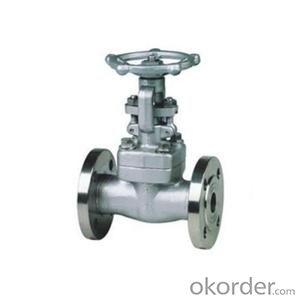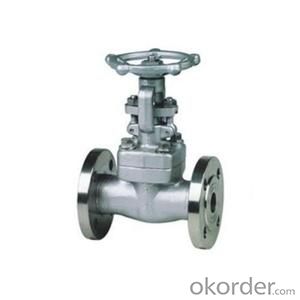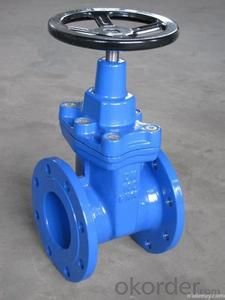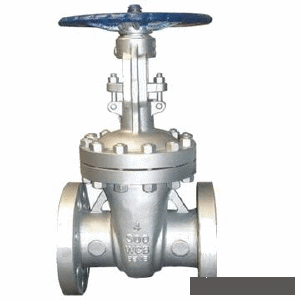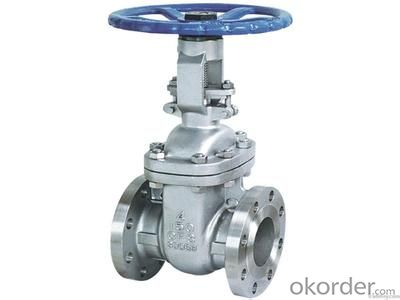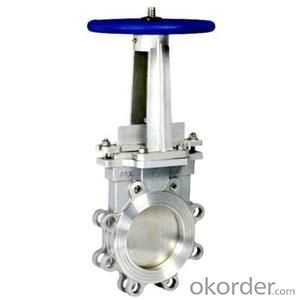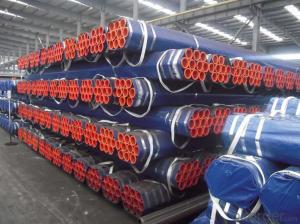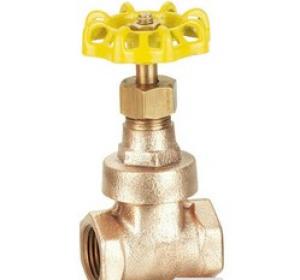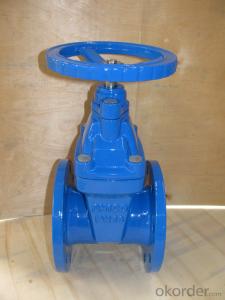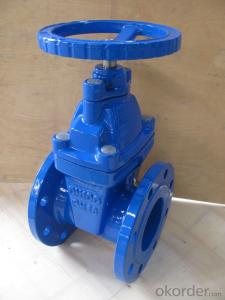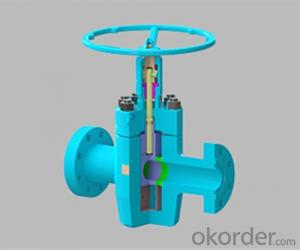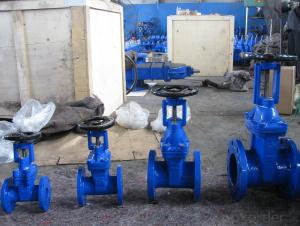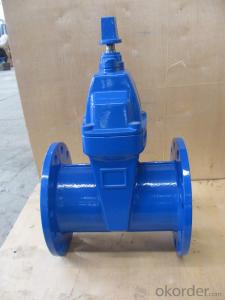STEEL GATE VALVE DIN3352 / BS5163 / API600
- Loading Port:
- Shanghai
- Payment Terms:
- TT OR LC
- Min Order Qty:
- 1 pc
- Supply Capability:
- 10000 pc/month
OKorder Service Pledge
OKorder Financial Service
You Might Also Like
Specifications
Gate Valves
1)DIN3352/BS5163/API600
2)Pressure:PN10/16
3)Dimension:2'-36'
1. About Our gate valves
Technical Specifications:
Design: DIN3352
Face to face: DIN3202-F4
Flange drilling: DIN2531 / DIN2532 /
DIN2533 / EN1092-2
Main Parts and Material:
| Item | Part Name | Material | Item | Part Name | Material |
| 1 | Body | GGG50 | 5 | Bonnet | GGG50 |
| 2 | Disc | GGG50 with NBR/SBR | 6 | Handwheel | GGG50 |
| 3 | Stem Nut | Brass with GGG50 | 7 | Brass Nut | Brass |
| 4 | Stem | Stainless Steel/2Cr13 |
Main Dimensions:
| DN(MM) | 50 | 65 | 80 | 100 | 125 | 150 | 200 | 250 | 300 | 350 | 400 | 500 | |
| L | 150 | 170 | 180 | 190 | 200 | 210 | 230 | 250 | 270 | 290 | 310 | 350 | |
| D | PN10 | 165 | 185 | 200 | 220 | 250 | 285 | 340 | 395 | 445 | 505 | 565 | 670 |
| PN6 | 165 | 185 | 200 | 220 | 250 | 285 | 340 | 405 | 460 | 520 | 580 | 715 | |
2. Valves :
Gate Valves, Check Valves, Butterfly Valves, Strainers, Fire Hydrants and Full ranges of Pipeline products & accessories
DIN / BS / EN / API / ANSI / AWWA Standards available with different Material & Specs
Competitive Price, Reliable Quality & On-time Delivery
3. Production Facility :
Reliable Quality Assured by ISO 9001 2008
Competitive Price by Strict Cost Control
On-Time Delivery by All- Process Production Plan and Control
- Q: How do you clean steel pipes?
- To clean steel pipes, you can start by flushing them with water to remove any loose debris or dirt. Next, you can use a suitable cleaning solution specifically designed for steel pipes and apply it using a brush or sponge. Scrub the pipes thoroughly, paying attention to any stubborn stains or buildup. Rinse the pipes with water again to remove the cleaning solution, and finally, dry them thoroughly to prevent rusting.
- Q: Are steel pipes resistant to vibration?
- Yes, steel pipes are generally resistant to vibration due to their high strength and rigidity.
- Q: Can steel pipes be used for conveying potable water?
- Yes, steel pipes can be used for conveying potable water. However, it is important to ensure that the steel pipes are coated or lined with suitable materials to prevent corrosion and contamination of the water supply. Regular maintenance and monitoring of the pipes are also necessary to ensure the water remains safe for consumption.
- Q: What are the different types of coatings applied to steel pipes?
- There are several types of coatings applied to steel pipes, including epoxy coatings, fusion-bonded epoxy (FBE) coatings, polyethylene (PE) coatings, polyurethane (PU) coatings, and zinc coatings.
- Q: How can galvanized steel pipe be connected with stainless steel pipe?
- Welding methods are used to connect. Because galvanized pipe is in fact carbon steel pipe, so galvanized pipe and stainless steel pipe welding, in fact, carbon steel and stainless steel welding, welding of dissimilar materials.
- Q: What is the role of steel pipe manufacturers in sustainable development?
- The role of steel pipe manufacturers in sustainable development is to promote environmental responsibility and resource efficiency throughout the production process. They play a crucial role in reducing carbon emissions by adopting cleaner technologies, optimizing energy consumption, and implementing waste management strategies. Additionally, steel pipe manufacturers can contribute to sustainable development by prioritizing the use of recycled materials, supporting recycling initiatives, and ensuring their products have a long lifespan to minimize waste generation. By embracing sustainable practices, steel pipe manufacturers can help create a more sustainable future for the construction and infrastructure industries.
- Q: What are the environmental impacts of steel pipe production and disposal?
- Significant environmental impacts are associated with the production and disposal of steel pipes. First and foremost, the production of steel pipes necessitates the extraction of raw materials such as iron ore, coal, and limestone. This extraction process leads to the destruction of habitats, deforestation, and soil erosion. Furthermore, mining and processing these materials require a substantial amount of energy, often derived from fossil fuels, which contributes to the emission of greenhouse gases and air pollution. The manufacturing process itself encompasses various stages, such as melting, casting, rolling, and coating, all of which demand considerable energy inputs and emit substantial quantities of carbon dioxide and other greenhouse gases. Additionally, the production of steel pipes involves the utilization of chemicals and additives that can pose harm to the environment if not properly managed. Moreover, if steel pipes are not recycled or appropriately dealt with during disposal, they can end up in landfills, thus contributing to waste accumulation and occupying valuable space. Steel is typically non-biodegradable and can take hundreds of years to decompose. When steel pipes are dumped in landfills, they can release toxic substances and heavy metals, which can contaminate soil and groundwater. Nevertheless, it is important to acknowledge that steel pipes are highly recyclable, and recycling them significantly mitigates the environmental impact. Recycling steel pipes aids in the conservation of natural resources, reduces energy consumption, and lowers greenhouse gas emissions. Additionally, using recycled steel in the production of new pipes requires less energy and results in fewer emissions compared to using virgin materials. To minimize the environmental impacts of steel pipe production and disposal, it is crucial to advocate sustainable practices throughout the entire lifecycle of the product. This entails reducing energy consumption, utilizing renewable energy sources, implementing proper waste management strategies, and encouraging the recycling and reuse of steel pipes.
- Q: How are steel pipes protected against rust and corrosion?
- Steel pipes are protected against rust and corrosion through various methods such as applying protective coatings, galvanizing, and utilizing corrosion-resistant alloys.
- Q: How are steel pipes classified based on their thickness?
- Steel pipes can be classified based on their thickness into three main categories: Schedule, Nominal Pipe Size (NPS), and Wall Thickness. The Schedule classification is commonly used in North America and refers to the wall thickness of the pipe. It is denoted by numbers such as Schedule 10, Schedule 40, and Schedule 80, where the higher the number, the thicker the pipe. The Nominal Pipe Size (NPS) classification, on the other hand, is used internationally and refers to the inside diameter of the pipe. It is expressed in inches and is usually followed by a schedule number to indicate the wall thickness. For instance, NPS 6 Schedule 40 means a pipe with a 6-inch inside diameter and a wall thickness according to Schedule 40. Lastly, steel pipes can also be classified based on their wall thickness in millimeters or inches. This classification provides a more precise measurement of the pipe's thickness, usually referred to as the "wall thickness" or "wt" in specifications. The wall thickness is measured from the outside diameter to the inside diameter and can be expressed in various units of measurement, such as millimeters, inches, or gauge. In conclusion, steel pipes are classified based on their thickness using different systems such as Schedule, Nominal Pipe Size (NPS), and Wall Thickness. These classifications help ensure that the appropriate pipe is selected for specific applications, considering factors such as pressure requirements, structural integrity, and compatibility with other components of the system.
- Q: Are steel pipes suitable for food processing facilities?
- Yes, steel pipes are suitable for food processing facilities. Steel is a durable and hygienic material that is resistant to corrosion, making it ideal for transporting food products and maintaining their quality and safety. Additionally, steel pipes are easy to clean and disinfect, further ensuring sanitation standards in food processing facilities.
Send your message to us
STEEL GATE VALVE DIN3352 / BS5163 / API600
- Loading Port:
- Shanghai
- Payment Terms:
- TT OR LC
- Min Order Qty:
- 1 pc
- Supply Capability:
- 10000 pc/month
OKorder Service Pledge
OKorder Financial Service
Similar products
Hot products
Hot Searches
Related keywords
